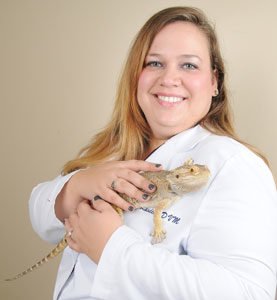National Reptile Awareness Day

Each year on October 21, people across the nation observe National Reptile Awareness Day. Created not only for reptile lovers to celebrate, but National Reptile Awareness Day also promotes education, conservation, and appreciation for reptiles. It is a day to learn about their natural habitats and the ecological threats that they are facing.
A reptile is any amniote that is neither a mammal nor a bird, is cold-blooded, has scales or scutes and can lay eggs on land. Scutes are the thick bony or horny plates which form the dermal layer of such reptiles like turtles and crocodiles. There are more than 10,000 species of reptiles.1
How To Observe
Visit the zoo to see some reptiles or do some research on them. Use #ReptileAwarenessDay to post on social media.
If you already own a reptile, now is a good time to make sure your pet reptile is getting an annual check up.
 Many reptile owners are surprised to learn that all pets need at least an annual checkup. A number of reptile veterinarians actually recommend checkups at least twice a year. There are two reasons for this: first, since most pets including reptiles do not live as long as people, getting a checkup only once a year is like you going to your doctor every 5-10 years. This is too long to wait to find out if something is wrong with your pet. Second, early detection and treatment of disease is very important in giving your pet the best prognosis for recovery from a disease, and is less expensive than treating a serious problem. Regular veterinary care is necessary in order to ensure your pet lives a long, healthy life. This is what veterinarians call practicing preventive medicine.
Many reptile owners are surprised to learn that all pets need at least an annual checkup. A number of reptile veterinarians actually recommend checkups at least twice a year. There are two reasons for this: first, since most pets including reptiles do not live as long as people, getting a checkup only once a year is like you going to your doctor every 5-10 years. This is too long to wait to find out if something is wrong with your pet. Second, early detection and treatment of disease is very important in giving your pet the best prognosis for recovery from a disease, and is less expensive than treating a serious problem. Regular veterinary care is necessary in order to ensure your pet lives a long, healthy life. This is what veterinarians call practicing preventive medicine.
What are the parts of the reptile checkup?
 While veterinarians follow their own protocols when performing a routine annual or semi-annual examination, most recommend a series of tests to help maintain your pet reptile’s health. Depending upon the species of reptile involved, the testing performed, and the temperament of your pet, some or all of these tests may be performed under short-acting gas anesthesia. Most reptiles can be safely anesthetized, using an anesthetic gas like isoflurane or sevoflurane for the short period of time needed to perform the diagnostic testing. If your pet is easily stressed, it may be easier and safer to perform any procedures under anesthesia, as they will be less stressed when anesthetized; stress is a major cause of reptiles dying when handled.
While veterinarians follow their own protocols when performing a routine annual or semi-annual examination, most recommend a series of tests to help maintain your pet reptile’s health. Depending upon the species of reptile involved, the testing performed, and the temperament of your pet, some or all of these tests may be performed under short-acting gas anesthesia. Most reptiles can be safely anesthetized, using an anesthetic gas like isoflurane or sevoflurane for the short period of time needed to perform the diagnostic testing. If your pet is easily stressed, it may be easier and safer to perform any procedures under anesthesia, as they will be less stressed when anesthetized; stress is a major cause of reptiles dying when handled.
 Physical Examination – Every visit starts with a thorough physical examination. During the physical, the veterinarian will record your pet’s weight, general appearance, and mobility. An updated history will be taken and your reptile’s diet will be evaluated. The veterinarian will palpate (feel) various parts of the pet’s body. Any abnormalities that are noted or changes that have occurred since the previous visit may indicate the need for specialized testing.
Physical Examination – Every visit starts with a thorough physical examination. During the physical, the veterinarian will record your pet’s weight, general appearance, and mobility. An updated history will be taken and your reptile’s diet will be evaluated. The veterinarian will palpate (feel) various parts of the pet’s body. Any abnormalities that are noted or changes that have occurred since the previous visit may indicate the need for specialized testing.
“Any abnormalities that are noted or changes that have occurred since the previous visit may indicate the need for specialized testing.”
Blood Testing – Just as your own regular medical visit includes blood testing, so does a checkup for pets. Blood testing can include a complete blood count (examining the red blood cells, white blood cells, and thrombocytes) and serum biochemical profile (which looks at various organ enzymes.)
Fecal Analysis – Microscopic examination of the feces allows detection of internal parasites (coccidia, flagellates or other protozoa and intestinal worms.)
Microbiological Testing – Special stains called Gram’s stains may be used on fecal swabs, skin scrapings or other samples to detect the presence of abnormal bacteria or yeast. Depending upon the findings from the Gram’s stains, additional tests such as a culture and sensitivity may be needed to determine the species of bacteria or yeast and the appropriate treatment.
Radiological Testing – Using X-rays, your veterinarian can examine your pet’s body for abnormalities in the size, shape, and position of body organs; screen for masses such as tumors or granulomas; look for abnormal fluid accumulation; and check the bones and joints.2
So don’t wait! Schedule an appointment for your reptile and make sure they are healthy and happy.
1 National Day Calendar 2 Rick Axelson, DVM, Courtesy of Lifelearn Inc. Used and/or modified with permission under license.
- Behavior (11)
- Caring for your pet (263)
- cat (4)
- Community Events (19)
- dog (6)
- From Our Clients (15)
- Happy Tails (8)
- News (418)
- Press (53)
- Products (2)
- Questions (4)
- Recalls (1)
- Special Offers (5)
- Tips & Advice (231)
- Uncategorized (19)
- Veterinary Services (48)


